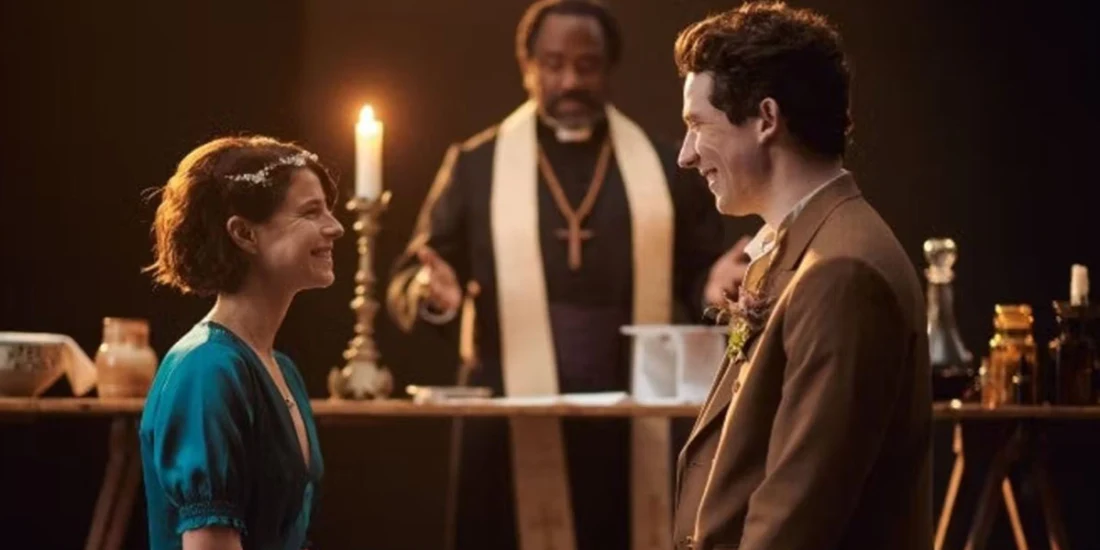
A complete guide to William Shakespeare's 'Romeo and Juliet'
We all probably had to read Romeo and Juliet in school, but there’s so much more than meets the surface in this story of Shakespeare’s titular star-crossed lovers. Learn more about Romeo and Juliet below, with a plot summary, character list, and top quotes from the Shakespeare play.
What is Romeo and Juliet about?
Likely written about 1595, Romeo and Juliet adapts an Italian novella into one of the most famous tragedies of all time. The warring Capulet and Montague families have the city of Verona in disarray. At a party, Romeo Montague and Juliet Capulet meet and fall in love in defiance of their families’ rivalry.
With the help of Romeo’s mentor Friar Lawrence and Juliet’s Nurse, the young lovers secretly marry — but after a fight between Juliet’s hot-tempered cousin Tybalt and Romeo’s reckless friend Mercutio ends in Mercutio’s death, Romeo takes revenge by killing Tybalt and is banished from the city. Juliet is left to find a way to reunite with Romeo as her parents try to rush her into a marriage to Paris, the Prince of Verona’s cousin.
After her father threatens to disown her if she refuses to marry, Friar Lawrence helps Juliet devise a scheme to pretend to be dead on the morning of her wedding. The message informing Romeo of this plan is waylaid, and Romeo only hears of Juliet’s death and rushes to her tomb to poison himself. Juliet wakes and refuses to flee with the Friar — instead, she too kills herself with Romeo’s dagger. The Montagues and Capulets, finding their dead children, vow to reconcile.
Who are the main characters in Romeo and Juliet?
From the young lovers to the warring families, take a look at the cast of characters in Romeo and Juliet below.
- Romeo: Heir of the Montague family. Romeo’s dreamy and easily love-struck — but meeting Juliet is different.
- Juliet: Heir of the Capulet family. Initially sheltered and obedient, falling in love with Romeo reveals a streak of sharp intelligence, practicality, and defiance.
- Friar Lawrence: Romeo’s mentor. Friar Lawrence’s greatest hope is to create peace between the Montague and Capulet families… but one could argue he doesn’t always think his plans all the way through.
- The Nurse: Juliet’s very talkative companion. Good natured and very funny, she does her best to be unfailingly loyal to Juliet.
- Mercutio: Romeo’s best friend. A master of wordplay, he has no patience for lovesickness… or Capulets.
- Tybalt: Juliet’s cousin. Hot-tempered and one of the main instigators of fights between Montagues and Capulets.
- Lord and Lady Capulet: Juliet’s parents. Though they want to see her happy, they also expect her to be obedient.
- Benvolio: Romeo’s cousin. A natural peace-keeper, which isn’t an easy thing to be in Verona.
- Paris: Juliet’s would-be fiancé, a relative of the Prince.
Top quotes from Romeo and Juliet
Romeo and Juliet is infinitely quotable with its monologues and declarations of love and woe, and here are some of the top quotes from Shakespeare’s Romeo and Juliet.
“If I profane with my unworthiest hand
This holy shrine, the gentle sin is this:
My lips, two blushing pilgrims, ready stand
To smooth that rough touch with a tender kiss.”
This is the beginning of what people call the “Pilgrims sonnet.” Romeo and Juliet speak for the first time, their language combining to create a sonnet. Romeo begins the exchange by apologizing for daring to touch Juliet’s hand, which he compares to a holy shrine… but assures her that if he has offended her, he can make up for it with a kiss.
“My only love sprung from my only hate!
Too early seen unknown, and known too late!
Prodigious birth of love it is to me
That I must love a loathèd enemy.”
Shortly after meeting Romeo, Juliet learns his true identity: the son of her family’s enemy. She laments the ‘prodigious’ or monstrous ‘birth of love’ – that is, that her very first experience of love should turn out to be such a disaster, because she saw and fell in love with Romeo, then learned his identity ‘too late.’
“But soft, what light through yonder window breaks?
It is the East, and Juliet is the sun.
Arise, fair sun, and kill the envious moon,
Who is already sick and pale with grief
That thou, her maid, art far more fair than she.”
Romeo sneaks into Juliet’s garden after meeting her at the party. Standing down in the garden, he spies her in her bedroom window up above and imagines her golden beauty, like the rising sun, outshining the beauty of the pale moon.
“O Romeo, Romeo, wherefore art thou Romeo?
Deny thy father and refuse thy name,
Or, if thou wilt not, be but sworn my love,
And I’ll no longer be a Capulet.”
Juliet also has Romeo on her mind after the party. In these famous lines, she asks not where is Romeo, but why does he have to be named Romeo – that is, why does he have to be a Montague? She’s talking to herself, but she imagines asking him to give up his name and family in exchange for her love – or if he won’t, she’ll give up hers.
“My bounty is as boundless as the sea,
My love as deep. The more I give to thee,
The more I have, for both are infinite.”
Another famous set of lines, as Juliet bids farewell to Romeo after their first real conversation, she marvels that her love for him, and her ability to express it, feels as infinite and endless as the ocean.
“These violent delights have violent ends
And in their triumph die, like fire and powder,
Which, as they kiss, consume. The sweetest honey
Is loathsome in his own deliciousness
And in the taste confounds the appetite.
Therefore love moderately. Long love doth so.
Too swift arrives as tardy as too slow.”
Friar Lawrence has agreed to marry Romeo and Juliet, but even on the day of the wedding itself, he continues to urge caution. He compares over-enthusiastic passion to ‘fire and powder’ – that is, gunpowder – which explode and consume one another. He also compares it to sweet honey, which not only becomes tiring if you have too much, it ruins your normal appetite. The key, he concludes, is moderation – moving too fast can be as bad as going too slow.
“No, ’tis not so deep as a well, nor so wide as
a church door, but ’tis enough. ’Twill serve. Ask for
me tomorrow, and you shall find me a grave man. I
am peppered, I warrant, for this world. A plague o’
both your houses! Zounds, a dog, a rat, a mouse, a
cat, to scratch a man to death!”
Wounded in his duel with Tybalt, Mercutio begins these lines trying to play off his injury – it’s not that deep, not that wide – but, he concludes, it’ll be enough to kill him… though in typical fashion, he can’t say that directly. We also get the first use of the famous line, ‘A plague o’ both your houses!’, cursing both Romeo and Tybalt for leading to Tybalt to ‘scratch a man to death’ – that is, to kill Mercutio with such a tiny wound.
“Come, gentle night; come, loving black-browed night,
Give me my Romeo, and when I shall die,
Take him and cut him out in little stars,
And he will make the face of heaven so fine
That all the world will be in love with night
And pay no worship to the garish sun.”
Unaware that Romeo has killed Tybalt and been banished, Juliet waits impatiently for night to come, so that she and Romeo can share their wedding night. She calls to night itself, asking it to bring Romeo to her, and imagines that, like a mythological lover, he will be turned into a constellation after his death, so that the whole world will love him, and the nighttime, as much as she does.
“Wilt thou be gone? It is not yet near day.
It was the nightingale, and not the lark,
That pierced the fearful hollow of thine ear.
Nightly she sings on yond pomegranate tree.
Believe me, love, it was the nightingale.”
Romeo sneaks to Juliet’s for them to spend one night together before his banishment. In the morning, Juliet urges him to stay with these famous lines, insisting that the birdsong outside their window isn’t a lark (a bird that sings in the morning), but the nightingale (a bird that sings at night), so he doesn’t have to leave yet.
“A glooming peace this morning with it brings.
The sun for sorrow will not show his head.
Go hence to have more talk of these sad things.
Some shall be pardoned, and some punishèd.
For never was a story of more woe
Than this of Juliet and her Romeo.”
Depending on the version of the text, these lines are either spoken by the Prince of Verona, or the same Chorus that delivered the Prologue. It describes a gloomy morning that matches the mood of Verona itself as it mourns the loss of Romeo and Juliet.
Originally published on









